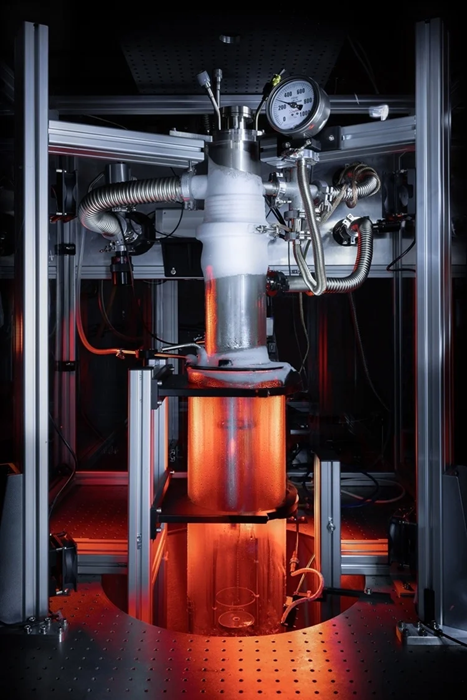Mar 21 2024Reviewed by Lexie Corner
By simulating a black hole in superfluid helium, scientists, for the first time, have been able to see more closely how analog black holes function and interact with their surroundings.
 Bespoke cryogenic system built for the superfluid helium experiment. Image Credit: Leonardo Solidoro
Bespoke cryogenic system built for the superfluid helium experiment. Image Credit: Leonardo Solidoro
The University of Nottingham, in partnership with King's College London and Newcastle University, has developed a quantum tornado as a novel experimental platform. They have cooled superfluid helium to the lowest attainable temperature and built a massive swirling vortex inside.
The research team has demonstrated that these quantum tornadoes mirror the gravitational circumstances surrounding revolving black holes by observing minute wave dynamics on the superfluid's surface. The research was published in the journal Nature.
Using superfluid helium has allowed us to study tiny surface waves in greater detail and accuracy than with our previous experiments in water. As the viscosity of superfluid helium is extremely small, we were able to meticulously investigate their interaction with the superfluid tornado and compare the findings with our own theoretical projections.
Dr. Patrik Svancara, Study Lead Author, School of Mathematical Sciences, University of Nottingham
The group built a custom cryogenic system that can hold many liters of superfluid helium at temperatures below -271 °C. Liquid helium acquires peculiar quantum characteristics at this temperature.
This system shows how the superfluid helium interface functions as a stabilizing influence for other quantum fluids, such as ultracold atomic gases or quantum fluids of light, whose features normally prevent the creation of large vortices.
Superfluid helium contains tiny objects called quantum vortices, which tend to spread apart from each other. In our set-up, we have managed to confine tens of thousands of these quanta in a compact object resembling a small tornado, achieving a vortex flow with record-breaking strength in the realm of quantum fluids.
Dr. Patrik Svancara, Study Lead Author, School of Mathematical Sciences, University of Nottingham
Researchers have revealed fascinating similarities between vortex flow and the gravitational effects of black holes on the space around them. This breakthrough paves the way for exploring finite-temperature quantum field theories in the intricate domain of curved spacetimes through simulations.
When we first observed clear signatures of black hole physics in our initial analog experiment back in 2017, it was a breakthrough moment for understanding some of the bizarre phenomena that are often challenging, if not impossible, to study otherwise. Now, with our more sophisticated experiment, we have taken this research to the next level, which could eventually lead us to predict how quantum fields behave in curved spacetimes around astrophysical black holes.
Silke Weinfurtner, Professor, School of Mathematics, University of Nottingham
This research was supported by a £5 million grant from the Science Technology Facilities Council, distributed among teams at seven leading UK institutions, including the University of Nottingham, Newcastle University and King’s College London.
The project has also been funded by the UKRI Network grant on Quantum Simulators for Fundamental Physics and the Leverhulme Research Leaders Fellowship held by Professor Silke Weinfurtner.
Journal Reference:
Švančara, P., et al. (2024) Rotating curved spacetime signatures from a giant quantum vortex. Nature. doi.org/10.1038/s41586-024-07176-8
Source: https://www.nottingham.ac.uk/